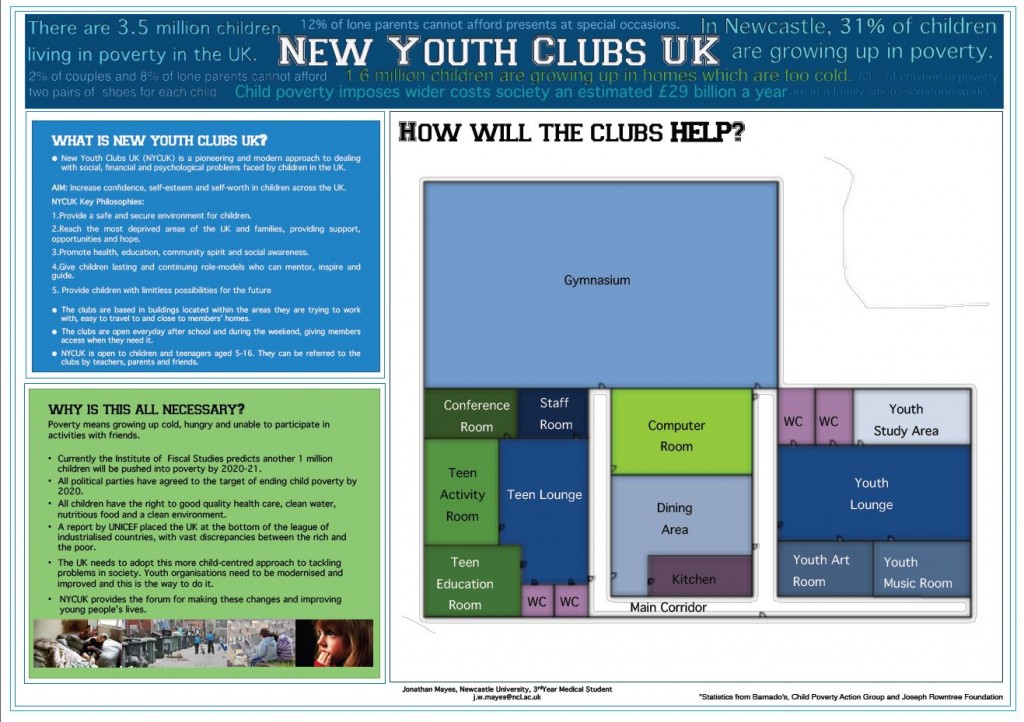Jonathan Mayes, Newcastle University Medical Student and overall winner of the NISR General Election Manifesto Competition, writes this blog on his proposal and why he felt compelled to try and tackle the problems associated with childhood poverty. You can contact Jonny with any thoughts or feedback you have by emailing: j.w.mayes@ncl.ac.uk.
After receiving an email about entering the competition I initially dismissed the idea. The idea of extra work didn’t appeal. However I saw an NSPCC statistic saying 31% of children in Newcastle are growing up in poverty. I didn’t know what this meant. What does it mean to be in poverty in the UK? I assumed that in a developed country that this statistic has no meaning. However I was shocked to discover poverty in the UK means growing up cold, hungry and not being able to enjoy activities with friends. Poverty impacts on health, educational opportunities and reduces self-esteem.
In 2010 the government said it would lower childhood poverty in the UK to 5-10% by 2020. At the current rate of increase by 2020 childhood poverty across the UK will be 23-24%, and even higher in areas such as Newcastle. This isn’t one political party’s responsibility and I believe new, alternative and modern approaches are needed. There should be individual, community and national responsibility to deal with these difficult issues in society.
New Youth Projects aims to combat childhood poverty across the UK. The idea is to set up buildings located within the poorest areas of the country. Children aged 5-16 from the poorest backgrounds would be actively sort out and invited to join the project. The projects would be open every day after school, weekends and holidays, with high contact hours ensuring lasting and guiding relationships. Projects would offer a range of services to the children all aiming to boost self-esteem, happiness and produce productive members of society. Examples of these include:
- Providing an evening meal, and involving children in the preparation of this meal educating about different food groups and portion size.
- Assisting with homework, helping children who are struggling at school and encourage them to continue with education.
- For older teenagers it would aim to help with CV writing, interviews skills and IT skills.
- Providing sport and exercise programmes to encourage physical activity, healthy body image and increase confidence.
- Promoting creative outlets such as drama and music classes, proven to increase self-esteem and increase aspirations.
- Mentoring schemes and programmes for young women and girls providing opportunity and contacts with professionals such as doctors, lawyers and businesswomen who they may rarely meet in daily life.
- For young boys a targeted effort to engage in discussion and activities aimed at reinforcing character and positive behaviour.
There are many more ways this scheme can benefit children and teenagers ranging from mentoring schemes to health interventions, more information can be found in my manifesto entry and the poster (below) used for the competition.
The idea is based on a model from the USA, Boys and Girls Clubs of America which has been operating for over 150 years. These clubs work with disadvantaged youth with incredible results and success. The key lessons learnt from their model were that the clubs are modern, dynamic and popular places that children were delighted to attend. They also rely on corporate sponsorship and large businesses to invest and support the clubs. It is there way of giving back to the community. I hope a similar scheme can be initiated in the UK.

